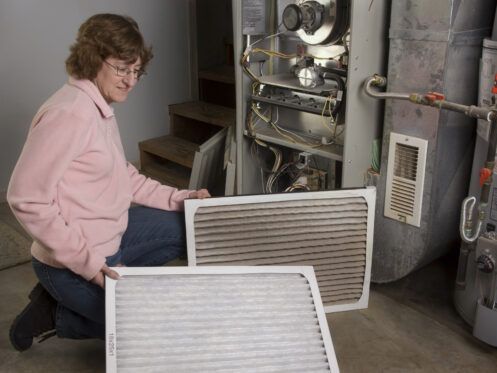There are several maintenance tasks that you can perform yourself to help your furnace work better and last longer. These tasks include keeping the area around the furnace clean and changing the filter on a regular basis. Even with the utmost care, though, you may experience problems from time to time. Knowing when to call a professional is key to fixing the issue correctly and making your home cozy and comfortable throughout the winter.
The Furnace Isn’t Producing Any Warm Air
If the furnace isn’t producing warm air, the source of the problem could range from a faulty thermostat to a malfunctioning heating element or ignition system. If you try to diagnose and repair the problem yourself, you put yourself in danger and also risk damaging the heater. Attempting DIY repairs also increases the chances of voiding any warranty you have on the furnace. This can lead to you having to pay for repairs out of your pocket that would have otherwise been covered.
The Furnace Keeps Overheating
An overheating furnace will usually exhibit several signs. It may keep cycling on and off or completely stop working. It might run as normal but blow cold air. Furnaces don’t normally overheat as long as you keep up with regular maintenance. Remembering to change the air filter, for example, improves airflow in the system, reducing the risk of overheating.
Blocked ventilation can lead to a furnace overheating as well. This is why it’s so important to regularly check the air vents in your home for obstructions. If the filter is clean, the vents aren’t closed or blocked, and the overheating problem still occurs, you should turn off the heater and call a repair technician right away. You may need to replace the furnace. This is because the older the heater gets, the more its parts wear out and the more likely it is to overheat. If you’ve had your heater for more than 15 years, it’s time to consider a replacement.
You Hear Strange Noises
It’s completely normal to hear a furnace kick on and off. You might even hear a whooshing noise as the air makes its way through ductwork and enters different rooms throughout your home. Some noises, however, should alarm you.
For example, if you hear a banging or booming noise when the heater kicks on, this could signal gas buildup, which can be incredibly dangerous. If you hear a screeching noise, there’s likely something wrong with the blower motor or the fan belt. You run the risk of doing more harm than good unless you turn off the system and get an expert to look it over.
Rattling and vibration sounds almost always indicate a loose part. And even though the furnace may continue to operate normally, fixing the loose part should be a top priority. If the loose component falls off or completely breaks, it can wreak havoc on the system and lead to a complete failure.
Grinding is another major noise concern to listen for that calls for contacting a professional right away. When metal components come into contact with one another, they grind and cause major wear and tear. Grinding noises are very common when there’s an issue with the heater’s blower wheel or motor bearings.
The Pilot Light Is Yellow
Keeping an eye on a pilot light is simple and straightforward: it should be bright blue at all times. There’s a chance the tip of the flame might have a bit of yellow or red in it, and this is perfectly normal. However, if it ever has a different color, you need to turn off the heater and call an expert.
A yellow pilot light is indicative of a major problem, which can vary from a poor oxygen supply to an improper mixture of gas and air. It could mean the gas supply has sulfur or moisture contaminants in it. There’s also a chance the thermocouple or gas valve is faulty. No matter the source of the yellow flame, it’s dangerous for you and your home. Calling a repairman right away will keep you and your family safe.
You Smell Foul Odors
Some foul odors don’t necessarily mean you need to contact a professional right away, but others do. When you notice a moldy or musty odor and the smell gets worse each time you turn on the furnace, it likely means there’s mold and mildew in the ductwork. This is a problem that requires professional duct cleaning.
Odors that mean you need to call a professional right away include burning smells and those that mimic rotten eggs, sulfur or a metallic scent. A burning or metallic smell usually indicates overheating and electrical problems. Odors similar to rotten eggs or sulfur are representative of gas leaks, which require immediate attention.
The Heater Keeps Kicking On and Off
Furnaces kick on and off as part of their normal heating process, but there should be a period of rest in between each cycle. If the heater keeps kicking on and off without periods of rest in between, it means there’s an underlying issue that requires immediate attention.
The first thing to do is to check the air filter. If it’s dirty, it can trigger the furnace to keep cycling on and off as it attempts to keep up with the thermostat settings. Changing the filter may fix the problem. It’s also possible that the thermostat isn’t reading correctly; this could be due to faulty sensors or dead batteries. If changing the filter and thermostat batteries doesn’t fix the cycling problem, there’s a bigger issue at play that needs professional help.
Frozen Pipes Connecting the Water Heater
In some homes, a furnace works with a water heater to provide hot water. When the pipes connecting the two systems freeze, it can lead to significant issues with the home’s heating and hot water supply. A professional can assess the situation and determine the best course of action, which will likely involve insulating the pipes. The goal is to keep the pipes from freezing and bursting, which can lead to flooding and major water damage.
The Blower Fan Isn’t Working
One of the most important parts of a furnace is the blower fan. It sucks in air from the return ducts, pushes it over a heat exchanger and then sends it through the ductwork and into different rooms throughout the home. When the blower fan stops functioning correctly, the home experiences uneven heating.
Several essential components in the furnace directly affect the performance of the blower fan. These parts include electrical wires, belts, fuses, capacitors, limit switches and more. If any of them becomes faulty, the blower fan won’t work as it should. Trying to find the exact source of blower fan issues can be tricky. This is why calling a professional technician is the smartest move to make.
You can lean on Summit Heating & A/C to meet all of your heating, cooling, plumbing and electrical needs. Contact us today to schedule furnace repair services for your Denver, CO, home.


